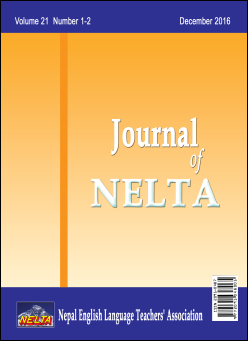Role and Status of English and Other Languages in Nepal
DOI:
https://doi.org/10.3126/nelta.v21i1-2.20206Keywords:
English and other languages, Monolingual policy, MultilingualismAbstract
This paper analyses the role and status of English and other languages in Nepal as well as talks about the attitude of several agents towards English and other languages when used in the domains such as education, media and business. Nepal is a culturally and linguistically diversified country and has undergone various socio-political changes in a very short span of time primarily beginning from 1950 as of now. These changes include abolition of Panchayat, a system in which the king ruled directly led to a democratic country and end of a decade long civil war as well as abolition of monarchy which led to a country as the federal republic. These socio-political changes have made a direct significant impact on language planning and policy. The official language, Nepali and the international language, English are the dominant languages in Nepal which in many cases overshadow the promotion of other vernacular languages. As a result, a majority of people opt for these dominant languages overlooking their own indigenous linguistic affluence. In this paper, as a conclusive remark, I also argue that some plans followed by pragmatic measures are needed to uplift the status of majority of other languages in Nepal.
Journal of NELTA, Vol. 21, No. 1-2, 2016, Page:105-112
Downloads
Downloads
Published
How to Cite
Issue
Section
License
© Nepal English Language Teachers’ Association (NELTA)
Authors are required to transfer their copyright to the Nepal English Language Teachers' Association (NELTA)
The Journal of NELTA is copyright by Nepal English Language Teachers’ Association (NELTA). Apart from citing/referencing in academic works, no part of any materials may be reproduced by any process without prior written permission from its copyright owner – NELTA. Requests and enquiries concerning reproduction and rights may be addressed to NELTA or the editorial board at neltaeditorialboard@gmail.com.




